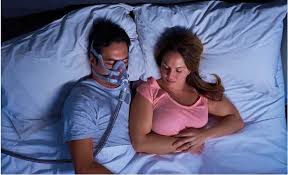Quick Fixes to Common Problems with CPAP Therapy

These are the responses that we provide to patients’ most common questions and challenges with CPAP therapy.
“It makes me feel claustrophobic.”
If you feel anxiety while wearing the CPAP mask, we recommend desensitizing techniques. Try holding it in front of your face for a period. Give yourself time to relax and become use to the air pressure before putting on the mask.
“I can’t fall asleep.”
It important to be tired in order to fall asleep when using a CPAP machine. While you are first getting comfortable with the therapy, try to avoid taking naps during the day. Relaxation techniques can also help CPAP users to calm their body and mind. Essentially fall asleep faster. Meditation and visualization can be powerful tools for success.
“The noise bothers me.”
You may just need to exchange your CPAP machine for a newer model. They have become much quieter in recent years. If the noise still annoys you, consider putting in earplugs, turning on some white noise, or listening to some soft music before falling asleep. You may also be able to get longer tubing in order to move the CPAP machine farther away from your bed.
“The straps are uncomfortable and rub my face.”
Sometimes tight straps can irritate the skin or leave red marks on your face. Consider adding CPAP strap covers to make wearing the mask more comfortable.
“It makes me congested.”
Sometimes CPAP treatment can cause nasal or sinus congestion. Usually, this problem can be resolved with an over-the-counter saline nasal spray.
“I wake up with a dry throat.”
It’s not uncommon for sleep apnea patients to complain about a dry throat, mouth, or nasal passages with CPAP therapy. Adjustable humidifiers are available; they are effective at adding the right amount of moisture and relieving the dry feeling.
“The mask is leaky.”
Air leaking out of the mask can be a sign of a few different problems. It may be resolved by simply adjusting the straps and pads for a เล่นบาคาร่า UFABET เว็บตรง ค่าคอมสูง better fit. If you notice that your eyes are watering, it may indicate that the mask is positioned incorrectly. If it is too high on the bridge of the nose, for example, the air will flow towards your eyes rather than into the airway.
Ask your supplier for help; you may need to switch to a different size mask or a different type of mask for a better fit.